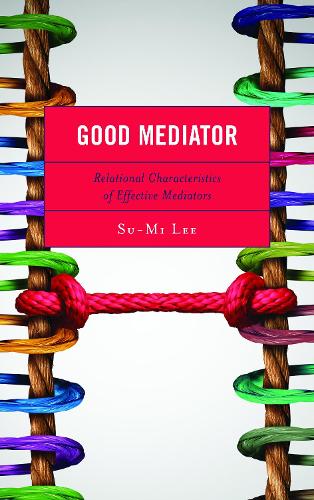
Good Mediator: Relational Characteristics of Effective Mediators
(Paperback)
Available Formats
Publishing Details
Good Mediator: Relational Characteristics of Effective Mediators
By (Author) Su-Mi Lee
Bloomsbury Publishing PLC
Lexington Books
10th June 2021
United States
Classifications
Professional and Scholarly
Non Fiction
Relationships and families: advice, topics and issues
Politics and government
331.89142
Physical Properties
Paperback
126
Width 153mm, Height 219mm, Spine 9mm
200g
Description
This book examines how mediators relational characteristics can alter the outcome of mediation in international militarized disputes. Rather than focusing on neutrality and bias that are rigorously discussed in the mediation literature, this book redefines the sources of effective mediators, impartiality and interest, and shows how such seemingly opposing characteristics of a mediator can lead to successful mediation through different channels, complementing each other. This book also uncovers the two dimensions of mediator trust, fairness and capacity. For mediation to be successful, disputants must trust that mediators are fair and capable of leading to successful mediation. The identification of these two sources is crucial as each of the two relational characteristics of mediators discussed above improves each dimension of the mediator trust. Moreover, this book explores how impartial and interested mediators are more or less effective in particular conflicts characterized by the nature of dispute, the nature of disputants relationships, and the nature of mediators. The books empirical analysis as well as case studies on the mediation cases led by the Philippines and Syria in the Borneo confrontation and Yemen dispute, respectively, demonstrate how the levels of mediator impartiality and mediator interest counterbalance each other in leading to mediation success.
Reviews
Lee (political science, Univ. of Hawai'i, Hilo) is interested in international relations, and in this volume she grapples with two sets of literature on mediation, one concerning disputants' trust in the mediator and the other the mediator's impartiality and interest in the dispute. She bridges these by separating trust into fairness and capacity and then linking fairness to impartiality and capacity to interestultimately arguing that the sum of impartiality and interest is the best predictor of both mediator occurrence and mediation success. High impartiality and high interest are best, but moderate impartiality can be offset by high interest and moderate interest can be offset by high impartiality. Two case studies examine whether interest alone or impartiality alone lead to mediation success. Lee's evidence is, at its core, statistical in nature, and she convincingly demonstrates that though the measure of impartiality predicts mediator occurrence and the measure of interest (weakly) predicts mediation success, only the sum of impartiality and interest predict both mediator occurrence and mediation success.
Summing Up: Recommended. Lower-division undergraduates through faculty.
* CHOICE *Good Mediator: Relational Characteristics of Effective Mediators is a noteworthy contribution to the conflict management field that deepens our understanding of the forces that drive successful international mediation. The book advances knowledge in the field by nicely unpacking, in ways that have been overlooked by previous research, the roles that mediator impartiality and interest play in shaping the outcome of mediation. Dr. Lee combines both a compelling theoretical narrative and rigorous empirical analysis of mediation, making the book an important resource for both students and practitioners of international mediation. -- J. Michael Greig, University of North Texas
Lee brings interesting new light to old issues in regard to mediation and in the process provides characteristics of an effective mediator in well-defined circumstances, using both big data and small cases. Her interacting variables are interest and bias, with resources, weight, and conflict stages added as context variables. This book surveys a large number of instances and uses statistical analysis to bring out clear conclusions. Lee then tests her ideas on two cases--Borneo and Yemen--to see how they land on the ground. The study will not lay to rest the debates over interest and bias as a help or hindrance to effective mediation but it will enrich. -- William Zartman, Johns Hopkins University
Author Bio
Su-Mi Lee is assistant professor in the Political Science Department at the University of Hawai`i at Hilo.
